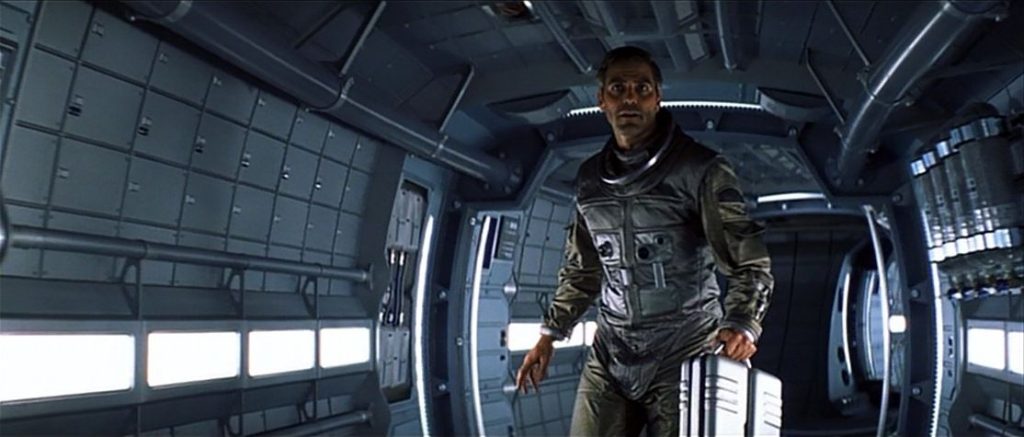Solaris (2002)

First off, I have to say that if you aren’t prepared to see a pure science fiction film, with all of the maturity and complexity that the term implies, you probably are better off not bothering to watch Steven Soderbergh’s latest gem, Solaris. It’s based on a classic science fiction novel by Stanislaw Lem, and has been made once before in a much different fashion by Andrei Tarkovsky in 1972, which many people have cited as a major influence. In fact, elements exist in many other Hollywood productions, although not very admirable ones like Sphere and Event Horizon, which I merely mention in case you’re scratching your head trying to place where you might have seen this film before.
Give credit to Soderbergh for not turning a thoughtful science fiction story into some Hollywood-ized roller coaster ride or tacking on some ridiculous ending to try to explain everything about the film. By making a film which will probably disappoint most viewers looking for your typically fun George Clooney flick, he has finally given the subject matter the integrity it richly deserves, and one which will endure for many years to come.
The setting is the future, where psychologist Chris Kelvin is sent to investigate a space station orbiting a distant world called Solaris after receiving an enigmatic transmission from the commander of the vessel. Kelvin finds that something is very wrong aboard the station when he discovers the commander is dead and the surviving crew is behaving in bizarre ways. After a night of sleep he discovers why, when his dreams become reality in the form of his deceased wife (McElhone), now laying next to him in true flesh and blood fashion. But is it really her, or just a memory come to life? Perhaps something more insidious.
I have to state that if you’re coming to my site in search of solutions to what actually is going on you won’t find it here. I try my best to avoid spoilers, so even if I had the answers (and I do have a theory that works for me,) it would not be appropriate in discussing in what is essentially a review on whether or not I recommend the film. In fact, the mystery of it is essential for the film to work, as it explores life, death, the existence of God, what it is to be human, and even further, what is the meaning of life. None of these things have easy or satisfying answers, so you might expect that a film built around these themes would not as well.
Even though the film doesn’t have a tight plot or a tangible storyline, it is still a well-crafted and fascinating piece of work. Soderbergh’s direction is different than what he’s done before, as is his custom, and shows how much of a master of all trades he is when he can make such a good film in a genre he hasn’t done before, especially if you consider what a complex piece he has chosen start off with. Most popular directors would probably have lost patience with the material and reworked the film into something more tangible, with a customary climax and resolution.
Although Clooney’s involvement may draw a crowd that will have expectations that are unmet, much the same way Adam Sandler had with Punch-Drunk Love, he does a commendable job acting in this film, especially when handling such complicated issues like the loss of a loved one or fear of the unknown. There’s no smart-ass lines to deliver or moments where he can get by with charm, and although more focus will probably be drawn towards the nude scenes where he bares all, these are handled without any form of titillation or sense of gratuity. The rest of the cast is equally up to the task, especially Viola Davis as Gordon, the fearful but gutsy woman who seeks to stop the events at all costs.
Solaris is primarily recommended for those who love science fiction in its purest of forms, like 2001: A Space Odyssey or Blade Runner, and especially for those who are familiar with the novel and previous film but are curious to see another take on the subject. It is also recommended for those who like films with challenging meanings and artistic merit. I don’t recommend it for those who want to see lots of action or humor, as this is a slow piece with lots of moments for reflection, and it doesn’t pay off with an ending that will leave you smiling.
Soderbergh has become one of my favorite directors of the past decade or so, and just as Solaris brings up many questions in its story that are largely left unanswered, so does a director who seems equally as enigmatic by doing so many completely different films with almost effortless finesse.
Qwipster’s rating: A-
MPAA Rated: PG-13 on appeal for sexuality/nudity, brief language and thematic elements (re-rating on appeal)
Running Time: 99 min.
Cast: George Clooney, Natascha McElhone, Jeremy Davies, Viola Davis, Ulrich Tukur
Director: Steven Soderbergh
Screenplay: Steven Soderbergh (based on the novel by Stanislaw Lem)
